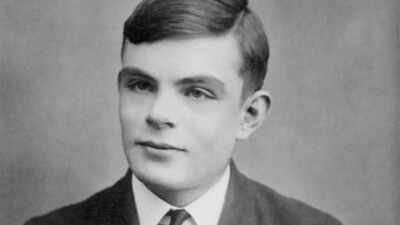June 23 is an important day. While for most the day is just another day of the summer, for some it is International Olympic Day. Not many remember June 23rd, as the birthday of Alan Turing, a legendary British mathematician whose life story is as inspiring as disheartening.
Who was Alan Turing?

Image credits: X/@fermatslibrary
On June 23, 1912, in Maida Vale, London, Alan Turing was born to Julius Mathison Turing, who was on leave from his position with the Indian Civil Service (ICS) of the British Raj government and Ethel Sara Turing.
He studied at St Michael's primary school from the age of six to nine and at Hazelhurst Preparatory School in Sussex later. At 13, he went to Sherborne School, an independent boarding school where he is said to have found his first love- Christopher Collan Morcom, a fellow pupil whom he lost to bovine tuberculosis.
It was also during this time that Turing found his love for science and mathematics which he shared with Morcom. After graduating from Sherborne, Turing received a scholarship at King's College, Cambridge where he studied an undergraduate course in Schedule B. During his time here, he wrote numerous mathematical papers where he proved a version of the central limit theorem, equivalence of left and right almost periodicity.
Between 1935 and 1936, he worked on the decidability of problems, from Gödel's incompleteness theorems, where he replaced Godel's universal arithmetic-based formal language with formal and simple hypothetical devices that later came to be known as Turing machines.
During the Second World War, he was a leading participant in the breaking of German cyphers and also worked with Government Code and Cypher School, a British codebreaking organization. Here he worked on cryptanalysis of the Enigma cypher machine used by Nazi Germany. He specified an electromechanical machine called the 'bombe' that could break Enigma more effectively.
Over the years, Turing made great advances in mathematics and cryptanalysis and came to be known as the father of modern computing and artificial intelligence. While his career was exemplary, his personal life's struggle was worth remembering.
Why was Alan Turing prosecuted for being gay?

Image credits: Getty Images
In December 1951, Turing met Arnold Murray, a 19-year-old unemployed man with whom he began an intimate relationship in 1952. On January 23rd, Turing's house was burgled and Murray revealed to him that he and the burglar were acquainted.
Turing reported the crime and during the investigation accepted his sexual relationship with Murray. Homosexual acts were criminal offences in the United Kingdom at the time and thus both men were charged with "gross indecency" under Section 11 of the Criminal Law Amendment Act 1885. Turing was arrested, pleaded guilty and convicted.
However, instead of prison, he was subjected to chemical castration, where he received oestrogen injections for one year, intended to reduce his libido. Due to the entire case, his professional and personal life both were troubled with him being restricted from work.
Tragically in 1954, Turing was found dead from cyanide poisoning that was ruled as a suicide. But his death was not for nothing. In August 2009, British programmer John Graham-Cumming started a petition urging the British government to apologise for Turing's prosecution as a homosexual and with the petition receiving more than 30,000 signatures, Prime Minister Gordon Brown released a statement describing Turing's treatment as "appalling" In 2013, Queen Elizabeth II granted him a royal pardon under the Royal Prerogative of Mercy which fuelled the momentum for the 2017 'Alan Turing Law' which automatically pardoned thousands of men convicted under historical anti-gay laws.
Alan Turing's story is not just that of a genius but also of a man who unabashedly accepted himself and was resilient in all his pursuits- be it a career or love.













